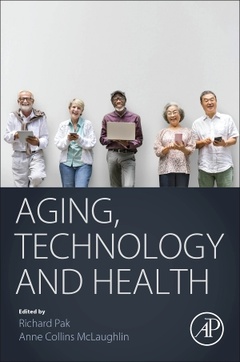Aging, Technology and Health
Coordonnateurs : Pak Richard, Mclaughlin Anne Collins-

Aging, Health and Technology takes a problem-centered approach to examine how older adults use technology for health. It examines the many ways in which technology is being used by older adults, focusing on challenges, solutions and perspectives of the older user. Using aging-health technology as a lens, the book examines issues of technology adoption, basic human factors, cognitive aging, mental health, aging and usability, privacy, trust and automation. Each chapter takes a case study approach to summarize lessons learned from unique examples that can be applied to similar projects, while also providing general information about older adults and technology.
1. Rethinking Technology Development for Older Adults: A Responsible Research and Innovation Duty 2. Challenges Associated with Online Health Information Seeking Among Older Adults 3. Improving Older Adults Comprehension and Use of Patient Portal-Based Health Information 4. Bringing Older Drivers up to Speed with Technology: Cognitive Changes, Training, and Advances in Transportation Technology 5. Technological Supports to Increase Nature Contact for Older Adults 6. Technological interventions for aging and motor control 7. Checking-in with My Friends: Results from an In-situ Deployment of Peer-to-Peer Aging in Place Technologies 8. Enhancing Social Engagement of Older Adults through Technology 9. Virtual Cognitive Training in Healthy Aging and Mild Cognitive Impairment 10. Social Agents for Aging-in-Place: A Focus on Health Education and Communication 11. Design of Human Centered Augmented Reality for Managing Chronic Health Conditions
Researchers and students in psychology, human factors, human-computer interaction, computer science, gerontology, and engineering.
Anne Collins-McLaughlin, an Associate Professor at North Carolina State University Department of Psychology, is the lab director of the Learning, Aging, and Cognitive Ergonomics Lab, and co-directs the Gains Through Gaming Lab. Her research looks at the motivation for cognitively complex activities, age-related changes in cognitive abilities, training to use technology, and cognitive ergonomics. She is author of the book Designing Displays for Older Adults (2010) and co-edits the Human Factors Blog (http://humanfactorsblog.org/).
- Discusses human factors design challenges specific to older adults
- Covers the wide range of health-related uses for technology—from fitness to leading a more engaged life
- Utilizes a case study approach for practical application
- Envisions what the future will hold for technology and older adults
- Employs a roster of interdisciplinary contributors
Date de parution : 03-2018
Ouvrage de 318 p.
15x22.8 cm
Thème d’Aging, Technology and Health :
Mots-clés :
Age-related change; Aging; Aging in place; Ambient Assisted Living; Augmented reality; Automation; Balance; Biomarkers; Chronic illness; Clinical outcomes; Cognitive; Cognitive plasticity; Cognitive training; Countermeasure; DigiSwitch; Digital divide; Driving; E-health; EHealth; Embodied conversational agents; Falls; HCI; Health; Health care portals; Health communication; Health education; Health information seeking; Health literacy; Health self-management; Health-supporting technology; Home; Home monitoring; Human-computer interaction; Imaging; Internet searches; M-health; Mild cognitive impairments; Mixed reality; Mobility; Motor control; Natural environments; Nature; Neural plasticity; Older adults; Online health information; Peer care; Physical environments; Postural control; Privacy; Responsible research; Review; Self-care; Serious games; Service; Simulation; Simulations; Social agents; Social engagement; Social networking sites; Socially assistive robotics; Technology; Technology acceptance; Technology design; Tele-care; Virtual environments



